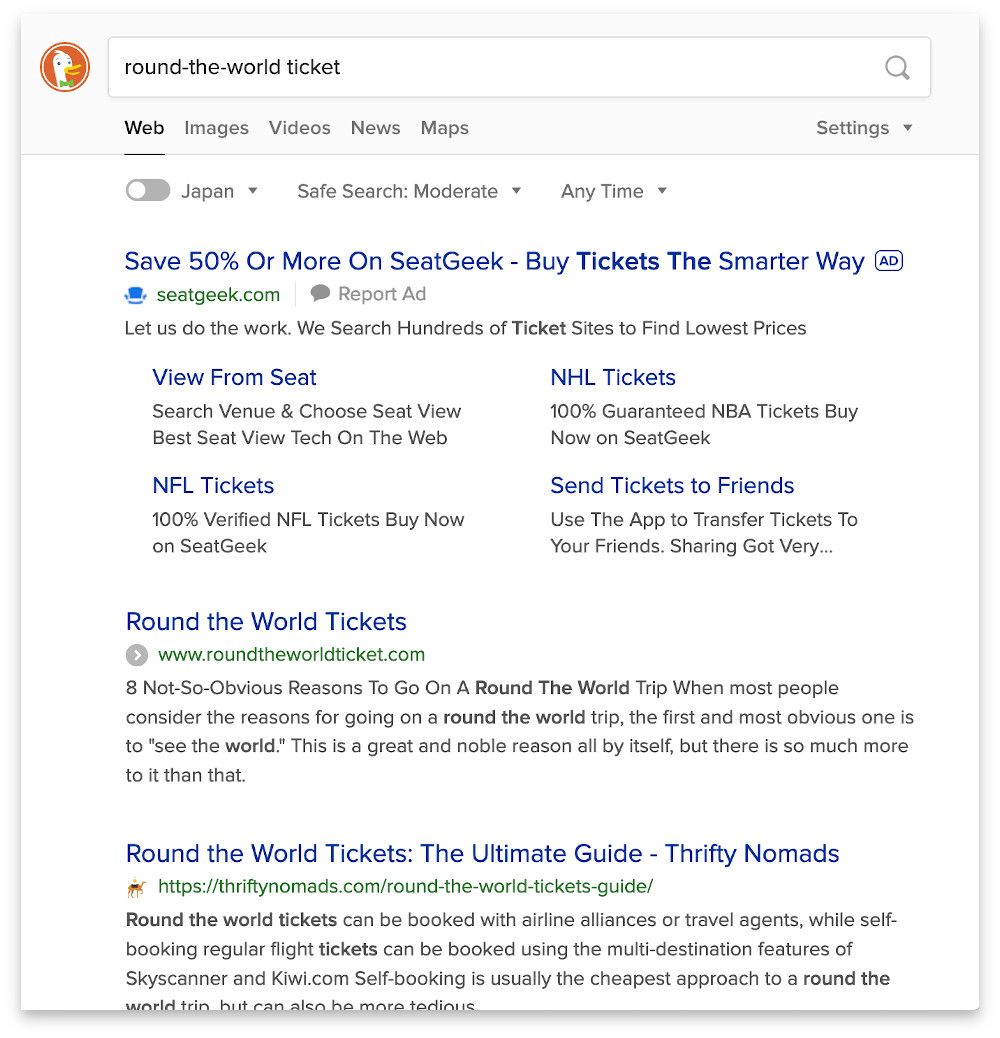What Is the Business Model for DuckDuckGo?
At DuckDuckGo, we’ve been profitable since 2014 without saving or sharing your search or browsing history when you view our search results or navigate to other websites. We’re proud to have a profitable business model that’s not dependent on exploiting your personal information. I’m happy to tell you about how we make this work.
How we make money
It is a myth that search engines need to track you to make money. The majority of our revenue is from private ads on our search engine. On most other search engines, ads are based on profiles compiled from your personal information, such as search, browsing, and purchase history. Since we don’t have that information per our Privacy Policy, search ads on DuckDuckGo are based on the search results page you’re viewing instead of being based on who other companies and their tracking algorithms assume you are as a person. For example, if you search for cars, we’ll show you ads about cars. We’ve even created a way to show localized ads while still keeping you completely anonymous. See the Anonymous Localized Results help page for more information on how we do this technically.
Advertising on DuckDuckGo takes the form of sponsored links that appear adjacent to search results. Viewing ads is privacy protected by DuckDuckGo and most ad clicks are managed by Microsoft’s ad network, though even in that case, “Microsoft Advertising does not associate your ad-click behavior with a user profile. It also does not store or share that information other than for accounting purposes.” We have a similar arrangement with TripAdvisor.
This is generally how advertising appears on DuckDuckGo:

We also make money from subscription fees. Specifically, the monthly or annual fee that subscribers pay to access Privacy Pro, our three-in-one subscription service that includes a VPN, a Personal Information Removal service and an Identity Theft Restoration service.
Google, Facebook, and The Creepy Line
Google also makes much of their money via keyword-based advertising that doesn’t require any search-history tracking. For example, if you type in "car" on Google, you will also see car ads. So why do they track it all? Because Google is not really a search company; they are an advertising company. On Google, your searches are tracked, mined, and packaged up into a data profile for advertisers to follow you around the Internet through intrusive and annoying ever-present banner ads, using Google’s massive ad networks, embedded across millions of websites and apps. This is why if you search for something on Google, you may start seeing ads for it everywhere.
Eric Schmidt, former Google CEO and Chairman, famously said “Google’s policy on a lot of these things is to get right up to the creepy line, but not cross it.” But for most people, that line was crossed by Google, Facebook, and others long ago. Alarmingly, Google now deploys hidden trackers on 85% of the top 50,000 websites to monitor your behavior and Facebook has hidden trackers on about 36% of websites, according to our research. That means, it is likely that Google and/or Facebook are watching you on most sites you visit, in addition to tracking you when using their products.
As a result, these two companies have amassed huge data profiles on individuals, which can include interests, past purchases, search, browsing and location history, and much more. This personal data is stored indefinitely and used for invasive targeted advertising that can follow you around the Internet.
This advertising system is designed to enable hyper-targeting, which has many unintended consequences that have dominated the headlines in recent years, such as the ability for bad actors to use the system to influence elections, to exclude groups in a way that facilitates discrimination (such as for job, housing, and educational opportunities), and to expose your personal data to companies you’ve never even heard of.
Our mission
Our mission is to show the world that protecting privacy is simple. For over a decade, we've created new technology and worked with policymakers to make online privacy simple and accessible for all. You can learn more about our ongoing efforts here.
Note: This blog post has been edited since initial publication to stay up to date with our evolving product offerings.
Looking for more? Follow us on Twitter!
